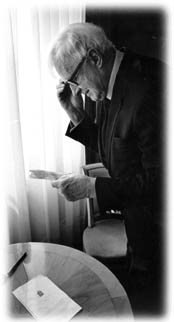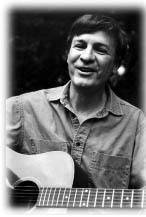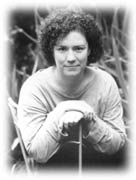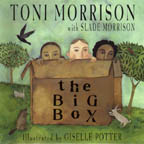In Review: October 6, 1999
Poetic License
Biographer David Leeming '58 talks about his thoroughly Modernist
subject, Stephen Spender
 It's a hot Albuquerque Saturday, but the second-floor studio of David
Leeming '58, in an outbuilding behind his family home, has the cool, secluded
feel of a treehouse. His wife of 32 years, and their daughter and granddaughter
wait patiently for him to accompany them on an outing to the Santa Fe Flea
Market, an hour's drive away. The Flea Market, according to Leeming, competes
with the Grand Bazaar in Istanbul. And attending the Santa Fe Opera reminds
him of the days when he and some friends in Turkey would pile onto the Orient
Express and travel three days to Vienna for the opera.
It's a hot Albuquerque Saturday, but the second-floor studio of David
Leeming '58, in an outbuilding behind his family home, has the cool, secluded
feel of a treehouse. His wife of 32 years, and their daughter and granddaughter
wait patiently for him to accompany them on an outing to the Santa Fe Flea
Market, an hour's drive away. The Flea Market, according to Leeming, competes
with the Grand Bazaar in Istanbul. And attending the Santa Fe Opera reminds
him of the days when he and some friends in Turkey would pile onto the Orient
Express and travel three days to Vienna for the opera.
Although Leeming is a slender and soft-spoken grandfather in tan slacks,
his surroundings indicate a life of intrigue and variety. The nuanced black-and-white
photos on the wall, of Leeming with James Baldwin and others, were taken
by his friend the writer Geoffrey Wolff, '60. Leeming's own books, which
number 17 including his Stephen Spender: A Life in Modernism, which Holt
will publish this month, are scattered around the spacious loft. His cat
Teeta strolls proudly around, bearing the name of the sensuously brilliant
cook from Like Water for Chocolate, a living symbol of Leeming's own passion
for food and for life.
Leeming explains the apparent contradictions of his life this way: "I
like good food and nice tablecloths, but I prefer that the people I talk
to over dinner are very interesting, not afraid of revealing the abnormality
that's in all of us. I like people who celebrate their quirks instead of
pretending they're like everybody else."
The son of an Episcopal priest from Peekskill, New York, Leeming had
never been far from home when Kay Cox of Princeton's Teacher Preparation
and Placement Service suggested he spend his post-graduate year teaching
at the secondary school of Roberts College in Istanbul. Although his degree
was in American civilization, and he spoke no Turkish, he eagerly accepted
the challenge and savored his opportunities.
He met Baldwin, for example, at a party in Istanbul. "We left the
party," he remembers, "and went out and talked about Henry James
all night. We shared an interest in James's characters, who are very often
Americans failing to see through their own myths and desperately trying
to avoid the reality in front of them."
Later, while Leeming was earning his Ph.D. at New York University with
a dissertation, "Henry James and the French Novelists," he worked
for Baldwin as a secretary and assistant, and he lived for a time with him
and with Baldwin's brother David. (In 1994, he also wrote James Baldwin:
A Biography.) "Interesting people came through to visit," remembers
Leeming. "Marlon Brando, Alex Haley . . ." In 1967, Leeming also
met a young woman who had "hitchhiked there, essentially, from Washington,
D.C." That was Pam Fraser, the free spirit who became his wife later
that summer.
Leeming's attraction to the open-minded, the creative, and the quirky
led to an immediate rapport with the British poet Stephen Spender when the
two were assigned to share an office in 1969, the first of Leeming's 26
years on the English Department faculty at the University of Connecticut
at Storrs. "Like Baldwin, Spender had an immense thirst for knowledge
and for life in general," he says. "They both loved people, and
talking and food and sex and living. Spen-der was always curious: he always
wanted to be there, wanted to know what people were thinking and doing.
He was, in the best sense, a sponge. He was attracted to anything unusual,
and that may explain his sexuality." Leeming holds that Spender is
one of the few truly bisexual people. "The ideal is that you fall in
love with a person, not with their genitalia. In practice, though, most
of us tend to be directed toward one gender or another, but some people
are genuinely able to fall in love with anyone. Spender was one of those
people."
Beyond his personal affection for his subject, Leeming sees Spender as
an important figure for scrutiny. "Spender was a kind of Orlando of
modernism," he explains, referring to the boy-girl-woman invented by
Virginia Woolf who lives for hundreds of years and bridges many eras and
aspects of British culture. "Spender met Yeats early in his career,
and he hung out with Ted Hughes and David Hockney late in his life. He knew
everybody in the arts from the 1920s to the 1990s. He was there at the first
of the sexual revolutions: he left Oxford in 1929 to go to the Weimar Republic
for the sun and sex. He was there at the Spanish Civil War; he was in America
during the student protests; and he was in Paris throwing cobblestones in
1968. He was a bridge figure who absorbed aspects of the political, social,
and artistic milestones of our times."
Leeming's own eclectic explorations have enabled him to write books ranging
from The Mythology of Native North America (University of Oklahoma Press,
1998, co-authored with his Princeton roommate Jake Page '58, who also lives
in Albuquerque) to a dictionary of Asian mythology (his current work-in-progress).
"Because we're all human," he explains, "there are remarkable
similarities of themes."
And what is the unifying theme in his own life? "Exploring the different
ways that the human being has tried to discover what it is," he answers
quietly. "Self-knowledge."
-Heather C. Liston '83
Heather C. Liston is a freelance writer living in New York and Santa
Fe.
Music with restorative power
Folksinger Ben Tousley '71 records his fifth CD, a retrospective
Open the Gates
Ben Tousley '71
cdfreedom.com
 Talk about tough audiences. Guitarist and songwriter Ben Tousley '71
once performed for the coma unit of a Boston hospital. The response wasn't
always easy to see, but it was remarkable to the people working with them,
he says. "It might have been one eye opening or a movement of a hand.
So-called captive audiences appreciate music so much. To me, it's a great
honor to play for them."
Talk about tough audiences. Guitarist and songwriter Ben Tousley '71
once performed for the coma unit of a Boston hospital. The response wasn't
always easy to see, but it was remarkable to the people working with them,
he says. "It might have been one eye opening or a movement of a hand.
So-called captive audiences appreciate music so much. To me, it's a great
honor to play for them."
Tousley first beheld music's restorative power when, as a conscientious
objector to the Vietnam War, he was assigned to the "locked area"
in the Neuropsychiatric Center in Skillman, New Jersey, a few miles north
of Princeton. "Giving people the chance to sing together transformed
a place of barrenness into one of hope," he says. People on the open
ward asked to be let back into the locked area to join in the music."
Since then, while working as a university chaplain, a newspaper reporter,
a Harvard divinity student, and, most recently, as an adjunct professor
at the Springfield College School of Human Services in New Hampshire, Tousley
has continued to write and perform music that comes out of people's struggles
in their everyday life. He names Pete Seeger as a particular inspiration,
and like the great folkie, his performances weave music, story-telling,
and history together in a committed act of grassroots activism. Each year
he gives about 25 workshops at schools, using songs to teach children about
the civil rights and labor movements.
Tousley recently released his fifth album, Open the Gates, a 15-track
career retrospective that includes a touch of country and gospel and a good
deal of catchy, inspiring folk. He has assembled a fine full band-Stuart
Schulman's violin work and Stanley Swann's drumming stand out in particular-but
the real star is Tousley's own beautiful baritone, which can sound as clear
and righteous as a choirboy's or as booming as Gordon Lightfoot's.
Following an old folk tradition, many of the songs have been written
for very personal occasions. "Dori and Jack's Wedding Song" celebrates
a late-life nuptials, while "My Brother" mulls over the wounds
of childhood. "I've written one for just about everybody in my family.
But a lot of them are gifts to me," he says, citing in particular the
title song, which was written following a mercifully brief battle with Hodgkin's
disease seven years ago. Not that there isn't a good deal of humor, too.
"Song for Barbara," for example, pays tribute to an exemplary
friend who for years has ministered to Boston's street people: "Barbara
McInness, like Guinness, she's stout/Good for what ails you from goosebumps
to gout."
The same could be said of Ben Tousley's sweet, moving music.
-Merrell Noden '78
Book briefings
A sampling of recent books of interest to Princetonians
 Sin and Syntax: How to Craft Wickedly Effective Prose, by Constance
Hale '80 (Broadway, $20). Constance Hale's new grammar guide reflects her
belief that "the flesh of prose gets its shape and strength from the
bones of grammar, and sinfully good writing depends on understanding both
the arcana of syntax and the artistry of music." The author of Wired
Style urges writers to strive for writing that thrills, by following advice
such as: Relish every word. Be simple, but go deep. Take risks. Seek beauty.
And find the right pitch. Hale dares to diagram sentences and excoriate
dreadful copy. She describes her do's and don'ts as "carnal pleasures"
and "cardinal sins," and she quotes Shakespeare and MTV in making
her points.
Sin and Syntax: How to Craft Wickedly Effective Prose, by Constance
Hale '80 (Broadway, $20). Constance Hale's new grammar guide reflects her
belief that "the flesh of prose gets its shape and strength from the
bones of grammar, and sinfully good writing depends on understanding both
the arcana of syntax and the artistry of music." The author of Wired
Style urges writers to strive for writing that thrills, by following advice
such as: Relish every word. Be simple, but go deep. Take risks. Seek beauty.
And find the right pitch. Hale dares to diagram sentences and excoriate
dreadful copy. She describes her do's and don'ts as "carnal pleasures"
and "cardinal sins," and she quotes Shakespeare and MTV in making
her points.
Inventing Paradise: The Greek Journey, 1937-47, by Edmund Keeley
'48 (Farrar, Straus & Giroux, $24). Keeley, the Charles Barnwell Straut
Professor of English, emeritus, and former head of Princeton's Creative
Writing and Hellenic Studies programs, blends memoir, literary criticism,
and cultural history as he writes of Greece before World War II. Focusing
on the literary odysseys of Henry Miller and Lawrence Durrell as they traveled
with George Seferis, George Katsim-balas, and others, he creates a tapestry
of a magical time for writers that began to unravel with the outbreak of
violence.
Eye of the Storm: Inside the World's Deadliest Hurricanes, Tornadoes,
and Blizzards, by Jeffrey Rosenfeld '86 (Perseus, $27.95). The Northeast's
Blizzard of '96 and the 1900 hurricane that flattened Galveston, Texas,
are only two of the major weather events that fall under the scrutiny of
Weatherwise magazine editor Rosenfeld. His detail-packed reporting covers
the history of weather science and those who made it, from Ben Franklin's
experiment with lightning to the Doppler-on-Wheels computer technology used
to analyze tornadoes quickly. Rosenfeld's blend of science, drama, and history
shows how far weather-watching has come from the days when people knew a
storm was coming because they felt it in their bones.
For Children
 The Big Box, by Toni Morrison with Slade Morrison (Jump at the
Sun, $19.95). "Who says they can't handle their freedom?" Morrison
throws down a gauntlet to readers in a story poem about three children who
make grown-ups nervous with their behavior. A teacher's comment to son Slade,
then 9, and his reactions to it, inspired the Nobel and Pulitzer Prizewinning
author to explore the pleasures and pitfalls of exuberant behavior and what
it means to follow rules. A subtext deals with parents and consumerism.
Illustrator Giselle Potter captures the mood evoked by Morrison, the Robert
F. Goheen Professor in the Humanities.
The Big Box, by Toni Morrison with Slade Morrison (Jump at the
Sun, $19.95). "Who says they can't handle their freedom?" Morrison
throws down a gauntlet to readers in a story poem about three children who
make grown-ups nervous with their behavior. A teacher's comment to son Slade,
then 9, and his reactions to it, inspired the Nobel and Pulitzer Prizewinning
author to explore the pleasures and pitfalls of exuberant behavior and what
it means to follow rules. A subtext deals with parents and consumerism.
Illustrator Giselle Potter captures the mood evoked by Morrison, the Robert
F. Goheen Professor in the Humanities.
Play Like a Girl: A Celebration of Women in Sports, edited by
Sue Macy '76 and Jane Gottesman (Holt, $15.95). Macy, who helped launch
a women's softball club while at Princeton, and sports reporter Gottesman
have created a pep rally in book form, pairing action photography with inspirational
quotes from women's sports literature. Track, basketball, crew, skateboarding-the
overall message is that girls can accomplish anything.
Love as Strong as Ginger, by Lenore Look '84 (Atheneum, $15).
The American dream of success for future generations reemerges, this time
from the perspective of a Chinese-American girl accompanying her immigrant
grandmother to her job "cracking crabs'' in a Seattle cannery. The
one-time visit opens the young girl's eyes to her grandmother's struggle
and goal of providing a better life for her granddaughter. Look draws from
her own memories to create this story, spiced with Chinese dialect and evocative
imagery. A gentle book with dreamy pastel illustrations by Ste-phen T. Johnson.
-Maria LoBiondo
GO TO
the Table of Contents of the current issue
GO TO
PAW's home page
paw@princeton.edu
 It's a hot Albuquerque Saturday, but the second-floor studio of David
Leeming '58, in an outbuilding behind his family home, has the cool, secluded
feel of a treehouse. His wife of 32 years, and their daughter and granddaughter
wait patiently for him to accompany them on an outing to the Santa Fe Flea
Market, an hour's drive away. The Flea Market, according to Leeming, competes
with the Grand Bazaar in Istanbul. And attending the Santa Fe Opera reminds
him of the days when he and some friends in Turkey would pile onto the Orient
Express and travel three days to Vienna for the opera.
It's a hot Albuquerque Saturday, but the second-floor studio of David
Leeming '58, in an outbuilding behind his family home, has the cool, secluded
feel of a treehouse. His wife of 32 years, and their daughter and granddaughter
wait patiently for him to accompany them on an outing to the Santa Fe Flea
Market, an hour's drive away. The Flea Market, according to Leeming, competes
with the Grand Bazaar in Istanbul. And attending the Santa Fe Opera reminds
him of the days when he and some friends in Turkey would pile onto the Orient
Express and travel three days to Vienna for the opera. Talk about tough audiences. Guitarist and songwriter Ben Tousley '71
once performed for the coma unit of a Boston hospital. The response wasn't
always easy to see, but it was remarkable to the people working with them,
he says. "It might have been one eye opening or a movement of a hand.
So-called captive audiences appreciate music so much. To me, it's a great
honor to play for them."
Talk about tough audiences. Guitarist and songwriter Ben Tousley '71
once performed for the coma unit of a Boston hospital. The response wasn't
always easy to see, but it was remarkable to the people working with them,
he says. "It might have been one eye opening or a movement of a hand.
So-called captive audiences appreciate music so much. To me, it's a great
honor to play for them." Sin and Syntax: How to Craft Wickedly Effective Prose, by Constance
Hale '80 (Broadway, $20). Constance Hale's new grammar guide reflects her
belief that "the flesh of prose gets its shape and strength from the
bones of grammar, and sinfully good writing depends on understanding both
the arcana of syntax and the artistry of music." The author of Wired
Style urges writers to strive for writing that thrills, by following advice
such as: Relish every word. Be simple, but go deep. Take risks. Seek beauty.
And find the right pitch. Hale dares to diagram sentences and excoriate
dreadful copy. She describes her do's and don'ts as "carnal pleasures"
and "cardinal sins," and she quotes Shakespeare and MTV in making
her points.
Sin and Syntax: How to Craft Wickedly Effective Prose, by Constance
Hale '80 (Broadway, $20). Constance Hale's new grammar guide reflects her
belief that "the flesh of prose gets its shape and strength from the
bones of grammar, and sinfully good writing depends on understanding both
the arcana of syntax and the artistry of music." The author of Wired
Style urges writers to strive for writing that thrills, by following advice
such as: Relish every word. Be simple, but go deep. Take risks. Seek beauty.
And find the right pitch. Hale dares to diagram sentences and excoriate
dreadful copy. She describes her do's and don'ts as "carnal pleasures"
and "cardinal sins," and she quotes Shakespeare and MTV in making
her points. The Big Box, by Toni Morrison with Slade Morrison (Jump at the
Sun, $19.95). "Who says they can't handle their freedom?" Morrison
throws down a gauntlet to readers in a story poem about three children who
make grown-ups nervous with their behavior. A teacher's comment to son Slade,
then 9, and his reactions to it, inspired the Nobel and Pulitzer Prizewinning
author to explore the pleasures and pitfalls of exuberant behavior and what
it means to follow rules. A subtext deals with parents and consumerism.
Illustrator Giselle Potter captures the mood evoked by Morrison, the Robert
F. Goheen Professor in the Humanities.
The Big Box, by Toni Morrison with Slade Morrison (Jump at the
Sun, $19.95). "Who says they can't handle their freedom?" Morrison
throws down a gauntlet to readers in a story poem about three children who
make grown-ups nervous with their behavior. A teacher's comment to son Slade,
then 9, and his reactions to it, inspired the Nobel and Pulitzer Prizewinning
author to explore the pleasures and pitfalls of exuberant behavior and what
it means to follow rules. A subtext deals with parents and consumerism.
Illustrator Giselle Potter captures the mood evoked by Morrison, the Robert
F. Goheen Professor in the Humanities.